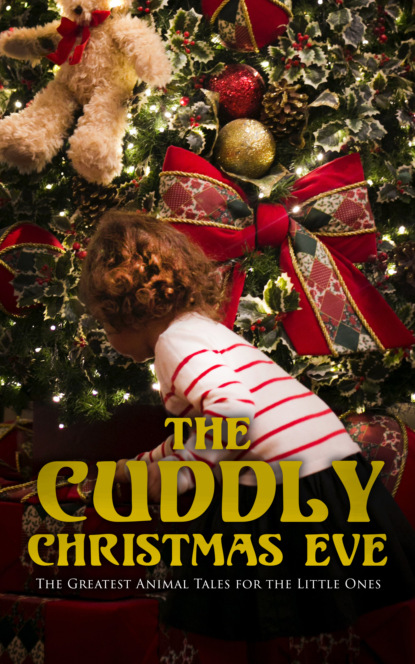upon the table – one-and-twenty button-holes – and who should come to sew them, when the window was barred, and the door was fast locked?
But that does not hinder the little brown mice; they run in and out without any keys through all the old houses in Gloucester!
Out of doors the market folks went trudging through the snow to buy their geese and turkeys, and to bake their Christmas pies; but there would be no Christmas dinner for Simpkin and the poor old Tailor of Gloucester.
The tailor lay ill for three days and nights; and then it was Christmas Eve, and very late at night. The moon climbed up over the roofs and chimneys, and looked down over the gateway into College Court. There were no lights in the windows, nor any sound in the houses; all the city of Gloucester was fast asleep under the snow.
And still Simpkin wanted his mice, and he mewed as he stood beside the four-post bed.
But it is in the old story that all the beasts can talk, in the night between Christmas Eve and Christmas Day in the morning (though there are very few folk that can hear them, or know what it is that they say).
When the Cathedral clock struck twelve there was an answer – like an echo of the chimes – and Simpkin heard it, and came out of the tailor’s door, and wandered about in the snow.
From all the roofs and gables and old wooden houses in Gloucester came a thousand merry voices singing the old Christmas rhymes – all the old songs that ever I heard of, and some that I don’t know, like Whittington’s bells.
First and loudest the cocks cried out — “Dame, get up, and bake your pies!”
“Oh, dilly, dilly, dilly!” sighed Simpkin.
And now in a garret there were lights and sounds of dancing, and cats came from over the way.
“Hey, diddle, diddle, the cat and the fiddle! All the cats in Gloucester – except me,” said Simpkin.
Under the wooden eaves the starlings and sparrows sang of Christmas pies; the jack-daws woke up in the Cathedral tower; and although it was the middle of the night the throstles and robins sang; the air was quite full of little twittering tunes.
But it was all rather provoking to poor hungry Simpkin!
Particularly he was vexed with some little shrill voices from behind a wooden lattice. I think that they were bats, because they always have very small voices – especially in a black frost, when they talk in their sleep, like the Tailor of Gloucester.
They said something mysterious that sounded like —
“Buz, quoth the blue fly; hum, quoth the bee;
Buz and hum they cry, and so do we!"
and Simpkin went away shaking his ears as if he had a bee in his bonnet.
From the tailor’s shop in Westgate came a glow of light; and when Simpkin crept up to peep in at the window it was full of candles.
There was a snippeting of scissors, and snappeting of thread; and little mouse voices sang loudly and gaily —
“Four-and-twenty tailors
Went to catch a snail,
The best man amongst them
Durst not touch her tail;
She put out her horns
Like a little kyloe cow,
Run, tailors, run! or she’ll
have you all e’en now!”
Then without a pause the little mouse voices went on again —
“Sieve my lady’s oatmeal,
Grind my lady’s flour,
Put it in a chestnut,
Let it stand an hour —”
“Mew! Mew!” interrupted Simpkin, and he scratched at the door.
But the key was under the tailor’s pillow; he could not get in.
The little mice only laughed, and tried another tune —
“Three little mice sat down to spin,
Pussy passed by and she peeped in.
What are you at, my fine little men?
Making coats for gentlemen.
Shall I come in and cut off your threads?
Oh, no, Miss Pussy, you’d bite off our heads!”
“Mew! Mew!” cried Simpkin. “Hey diddle dinketty?” answered the little mice —
“Hey diddle dinketty, poppetty pet!
The merchants of London they wear scarlet;
Silk in the collar, and gold in the hem,
So merrily march the merchantmen!”
They clicked their thimbles to mark the time, but none of the songs pleased Simpkin; he sniffed and mewed at the door of the shop.
“And then I bought
A pipkin and a popkin,
A slipkin and a slopkin,
All for one farthing —
and upon the kitchen dresser!” added the rude little mice.
“Mew! scratch! scratch!” scuffled Simpkin on the window-sill; while the little mice inside sprang to their feet, and all began to shout at once in little twittering voices – “No more twist! No more twist!” And they barred up the window shutters and shut out Simpkin.
But still through the nicks in the shutters he could hear the click of thimbles, and little mouse voices singing —
“No more twist! No more twist!”
Simpkin came away from the shop and went home, considering in his mind. He found the poor old tailor without fever, sleeping peacefully.
Then Simpkin went on tip-toe and took a little parcel of silk out of the tea-pot, and looked at it in the moonlight; and he felt quite ashamed of his badness compared with those good little mice!
When the tailor awoke in the morning, the first thing which he saw, upon the patchwork quilt, was a skein of cherry-coloured twisted silk, and beside his bed stood the repentant Simpkin!
“Alack, I am worn to a ravelling,” said the Tailor of Gloucester, “but I have my twist!”
The sun was shining on the snow when the tailor got up and dressed, and came out into the street with Simpkin running before him.
The starlings whistled on the chimney stacks, and the throstles and robins sang – but they sang
